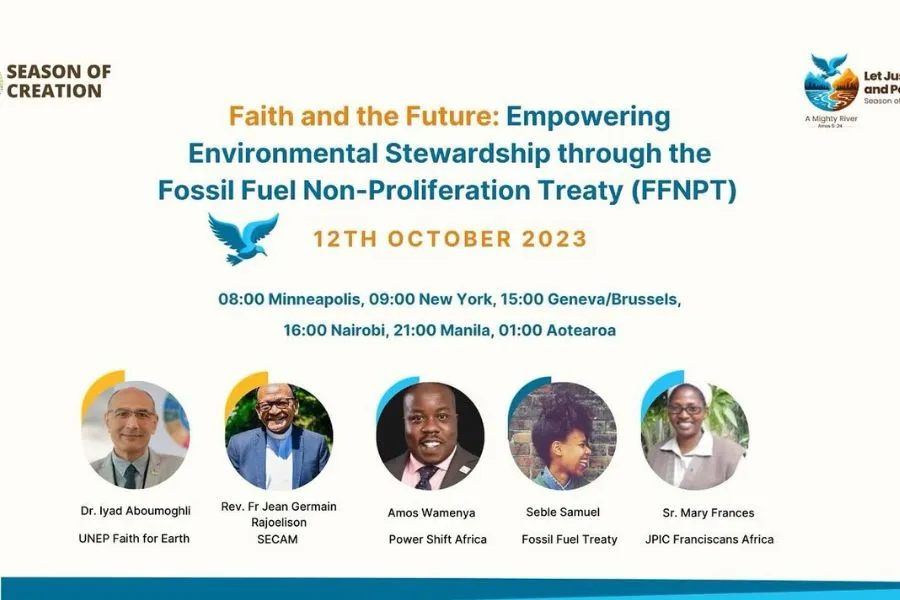
By Ashley Kitisya, Fossil Free Campaigner for Africa
In the heart of a recent webinar, titled “Faith and the Future: Empowering the Future through the Fossil Fuel Non-Proliferation Treaty,” a diverse panel of experts and an engaged audience gathered, united by a shared vision to shape a sustainable future for our planet.
As the virtual room filled with eager participants, it was Sister Mary Wangare Sebastian, the Director of the Justice Peace and Integrity of Creation Franciscans Africa (JPIC-FA) and a member of the Little Sisters of St. Joseph, who took the stage with a resounding message. Sister Mary underscored the importance of these gatherings that focus on the just energy transition in Africa. She shared her belief that faith plays a pivotal role in this transition, setting the tone for an event that would explore faith’s impact on environmental change.
During the course of the webinar, the Symposium of Episcopal Conferences of Africa and Madagascar (SECAM) Justice, Peace, and Development Commission made a powerful statement. In light of COP 28’s theme of health, recovery, and peace, SECAM called upon world leaders to listen to the plea of the Earth and its most vulnerable inhabitants. They urged the phasing out of fossil fuels and the endorsement and adoption of the Fossil Fuel Non-Proliferation Treaty (FFNPT), laying down a significant marker for the future.
This symposium, now in its second year, ventured to answer a crucial question: what role does faith play in shaping a renewable and just future through the proposed FFNPT?
The FFNPT is no ordinary initiative; it represents a set of international laws that, once formally adopted, would provide a solid solution to the ongoing debate on a just transition, labor in the fossil fuel industry, funding for nations rich in fossil fuels, and the crucial transition to renewable energy.
Dr. Iyad Abumoghli of UNEP Faith for Earth articulated the moral and spiritual imperative behind the FFNPT. He touched upon the inclusion of spiritual values in the new development paradigm, weaving together wisdom from Jewish, Islamic, and Christian traditions. These spiritual values, including stewardship of the Earth, justice, equity, and caring for future generations, mirror the ethical and moral principles embedded in FFNPT.
Speaking about sustainable energy solutions, Amos Wamenya from Powershift Africa painted a vivid picture of the challenges posed by inadequate access to clean and renewable energy in Africa; “Only three African countries, Kenya, Senegal, and Morocco, currently generate more than 10% of their electricity from wind and water”. Amos emphasized that the FFNPT framework is the missing tool that Africa needs to embark on the journey toward 100% renewable energy and ensure access to basic human rights.
Seble Samuel’s call to action resounded with urgency. “Redirecting resources from fossil fuel expansion to investing in renewable energy,” she explained, “could address the source of the climate crisis, which is fossil fuels.” Africa, boasting nearly 40% of the global renewable energy potential, stands at the crossroads of a profound change. The Fossil Fuel Treaty initiative offers a path toward a fossil-free future, in a continent where more than 600 million people are still without power.
In a world striving for change, Deraso Dokhole, a lawyer and head of policy at UCLG Africa, pointed to the successes of past treaties like the Nuclear Non-Proliferation Treaty. This was a testament to the possibility of garnering support for the FFNPT.
The voices of youth, represented by Clive Donnley, a climate policy advisor and activist, echoed the passion for advancing sustainability. The FFNPT, he argued, embodies a common commitment that can facilitate a just transition and ensure resilience in the face of environmental challenges.
Rukia Ahmed, a climate activist and representative of the Kenyan Inter-Universities Students Association, underlined the importance of support from countries responsible for emissions in ensuring a fair fossil fuel phase-out.
In the end, the webinar was a journey of faith, hope, and action. It showcased how faith-based principles, united with practical initiatives like the FFNPT, can chart a path toward a sustainable and just future. This gathering offered a glimpse of a world where faith, science, and advocacy converge to address the most pressing issues of our time.
For those interested in delving deeper into this remarkable event, the recording is available below. To read the full SECAM statement, visit this link here. As we stand at this critical juncture, the voices of faith and commitment to environmental change are paving the way for a brighter, more sustainable future.






Thank you Pope Francis for bringing the world up to date in #LaudateDeum.❤️ Lading up to #COP28UAE, this webinar is a must watch! Listen to ALL the great speakers…(and there are many)… How could anyone not support the Fossil Fuel Non Proliferation Treaty ? 😍🙏🏾🌏🌍🌎❤️
It was really amazing listening to expert with different perspectives towards a sustainable future. Together, we must enhance global solidarity in securing our planet as stewards